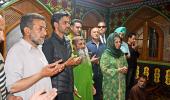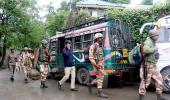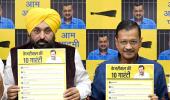The hapless voters fervently hope that they get to make a more equal choice in the next election and political discourse in the country becomes positive and more enlightened.
One wonders if the masses would become more politically aware to discern good intent and performance from gimmickry, observes Biswajit Dasgupta.

The nation is in the throes of an election to select parties and people that will govern the country from Delhi for the next five years.
The seven-phase process started on April 19 and will culminate on June 1, with counting scheduled on June 4.
Hectic efforts are underway by leaders of all descriptions to make a last-ditch effort at influencing voters to vote in their favour.
That, accompanied by chest-thumping about achievements, promises for the future and claims of surpassing the magic figure of 400 by one side to upstaging the ruling dispensation on the other are dominating the public discourse.
This much is tolerable and par for the course, though one would like to hear more discussion on the manifestos and future plans for the development of the country.
Informed and civilised public debate by politicians of opposing parties on mainstream visual media is non-existent in our country. It is a zero-sum game.
What is food for one is poison for the other. What is good work by one is burglary for the other.
What is a good scheme for one is promised to be revoked by the other if it comes to power.
What is good foreign policy for one is selling out to foreign powers for the other.
What is enforcement of law by one is misuse of Constitutional power by the other.
How unfortunate this country is, to deserve such public figures!
Maybe it is just as well that they do not appear on television -- they would most certainly replicate their behaviour in Parliament or in state assemblies.
Nobody is interested in explaining the 'why' of things to their electors.
Why are you promising what you are, in your manifesto? What good will it do to the country in the short and long-terms?
Why are we unable to rapidly improve our health, sanitation, education and economic well-being? Why are we spending huge amounts on mega schemes with little benefit other than assuring easy income and creating a lazy workforce?
Why are we unable to acheive the degree of cleanliness of which we can be proud? Why can't we rid ourselves of corruption in government through measures such as digitisation, removal of human interfaces, single-window systems, better and swift grievance redressal etc?
No leader is interested in talking about these things.
In fact, these are the reasons for which parties and individuals must be voted into or out of power.
There is a quote ascribed to Eleanor Roosevelt which goes like this -- 'Great minds discuss ideas; average minds discuss events; small minds discuss people.'
Going by what we see in the visual and print media and of course, in all election rallies, our political landscape is brimming with small minds.
Political discourse has reached a nadir and we seem to be digging further.
Every person delivering an election speech is just vilifying opponents, mostly through personal attacks.
He is a thief, she is a liar, this person supports rapists, that party has hoodwinked the country with slogans, that other guy judges people based on skin colour, X politician is hand-in-glove with Y and Z businessmen who are responsible for major political funding and so on.

Are we going to be led by a bunch of liars, corrupt people, thieves, racists and morally delinquent individuals?
It definitely appears so, to the great dismay of the educated, middle class, who unfortunately do not matter in Indian electoral mathematics.
The rich are insulated from all this and the poor are overwhemed in just getting by from day to day -- they will vote for any entity that gives them a 500 rupee note on election day.
So what does the hapless voter do?
Many do not even know the difference between parliamentary and assembly elections.
Most do not understand Centre-State dynamics.
For them, local issues like water supply, food prices, education for their children, decent jobs and a roof over their heads matter more than becoming the third largest economy, a space super-power or raking up long-settled bilateral issues like Kachhateevu.
Therefore, votes that matter will be cast on these daily subsistence issues and politicians and political parties will do well to address these pain points.
The Centre's work in the states must not just be substantial but must also be seen to be so, if regional party dominance is to be dented.
The aware voter has little choice in making a difference to the outcome of the parliamentary elections because their numbers are low and that too, concentrated in bigger cities and urban areas.
Voting for one dispensation may give it a sweeping majority, thereby undermining the democratic value of dialogue and a spirited opposition.
Some have started calling it the beginning of an 'elected autocracy.'
Voting the other dispensation could be a step in creating a viable opposition but Opposition parties have little to show in terms of credibility, cohesion or leadership.
The indifferent option of NOTA exists but for it to be effective, NOTA has to poll more votes than the other candidates -- in other words, NOTA has to win the election for a repoll. That is nowhere near happening in a hurry.
So, while nothing is over till it is over, the outcome of the parliamentary polls perhaps favours the ruling dispensation for the primary reason that the Opposition is in utter disarray.
The hapless voters fervently hope that they get to make a more equal choice in the next election and political discourse in the country becomes positive and more enlightened.
One wonders if the masses would become more politically aware to discern good intent and performance from gimmickry.
Vice Admiral Biswajit Dasgupta (retd) is a former Commander-in-Chief of the Eastern Naval Command.
Feature Presentation: Aslam Hunani/Rediff.com










